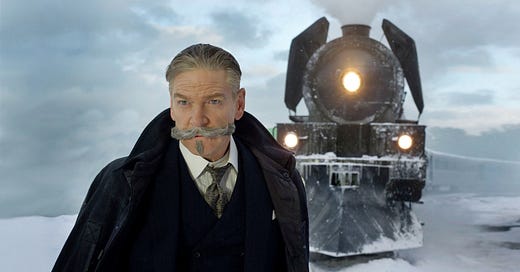Kenneth Branagh and the Art of the Adaptation: Or, There Is Right, There Is Wrong, There Is Nothing In-Between
Wrapping up this series with his Hercule Poirot trilogy.
If there's one thing we've learned about Kenneth Branagh throughout this series, it's that he's not afraid to take on an iconic character or figure. He's dressed up as King Henry V, Prince Hamlet, Iago, Laurence Olivier, and William Shakespeare himself. Playing Hercule Poirot, Agatha Christie's famous detective, could be daunting for others, and perhaps it was for Ken, but he knew he could do it. He did cast himself, after all.
About ten or fifteen years ago, someone at the Christie estate must've realized that their ownership of the copyright was running out, so they started going nuts with licensing new novels, movies, plays, and even video games based on her most famous mysteries. When Branagh's Murder on the Orient Express came out in 2017, Ken Ludwig's stage adaptation of the same material premiered just eight months earlier. This is not a coincidence. After years without Poirot on stage or screen (before the 2014 tour of the play Black Coffee, the character had been absent for over a decade), all of a sudden, he was everywhere.
There had been plenty of famous Poirots, of course. Albert Finney played him in Sidney Lumet's 1974 adaptation of Orient Express, earning an Oscar nomination for his work. Peter Ustinov played the part six times and is probably the most recognizable film version of the character - he's the one I remember watching with my grandmother. David Suchet played Poirot for 70 episodes of the eponymous tv show, from 1989 to 2013. The other Orient Express film starred Alfred Molina, portraying the iconic Belgian in his ongoing efforts to portray every single nationality on screen.
Keep reading with a 7-day free trial
Subscribe to Feature Presentation to keep reading this post and get 7 days of free access to the full post archives.




